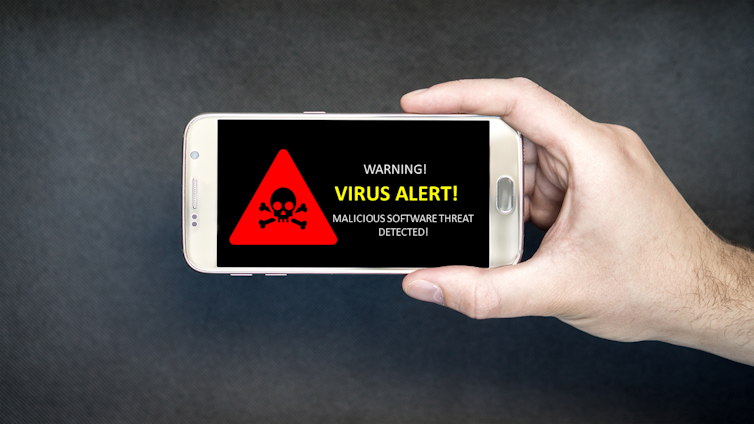Can You Send A Virus To Someones Phone
With nearly 84% of the world's population now owning a smartphone, and our dependence on them growing all the time, these devices have become an attractive avenue for scammers.
Terminal year, cyber security company Kaspersky detected nearly 3.5 million malicious attacks on mobile telephone users. The spam messages we get on our phones via text message or email will often contain links to viruses, which are a type of malicious software (malware).
In that location's a decent hazard that at some bespeak you lot've installed malware that infected your phone and worked (without you noticing) in the background. According to a global report commissioned by individual company Zimperium, more ane-fifth of mobile devices have encountered malware. And four in ten mobiles worldwide are vulnerable to cyber-attacks.
Merely how practice you know if your telephone has been targeted? And what can you practise?
How does a phone become infected?
Like personal computers, phones can exist compromised by malware.
For case, the Hummingbad virus infected ten million Android devices inside a few months of its creation in 2016, and put equally many as 85 million devices at risk.
Typically, a telephone virus works the same way every bit a computer virus: a malicious code infects your device, replicates itself, and spreads to other devices by automobile-messaging others in your contact list or auto-forwarding itself as an email.
A virus tin can limit your telephone's functionality, send your personal information to hackers, send your contacts spam letters linking to malware, and even permit the virus's operator to "spy" on y'all by capturing your screen and keyboard inputs and tracking your geographical location.
In Commonwealth of australia, Scamwatch received 16,000 reports of the Flubot virus over just eight weeks in 2021. This virus sends text messages to Android and iPhone users with links to malware. Clicking on the links can lead to a malicious app being downloaded on your phone, giving scammers access to your personal information.
Flubot scammers regularly alter their target countries. According to cyber security firm Bitdefender, FluBot operators targeted Australia, Germany, Poland, Spain, Austria, and other European countries between Dec 1 2021 and January 2 of this year.
Is either Apple or Android more secure?
While Apple devices are generally considered more secure than Android, and less prone to virus attacks, iPhone users who "jailbreak" or modify their phone open themselves up to security vulnerabilities.
Similarly, Android users who install apps from exterior the Google Play shop increase their risk of installing malware. It'south recommended all phone users stay on guard, as both Apple and Android are vulnerable to security risks.
That said, phones are generally ameliorate protected against viruses than personal computers. This is because software is ordinarily installed through authorized app stores that vet each app (although some malicious apps can occasionally slip through the cracks).
As well, in comparison to computers, phones are more secure as the apps are usually "sandboxed" in their own isolated environment – unable to access or interfere with other apps. This reduces the risk of infection or cross-contamination from malware. Still, no device is entirely immune.

Watch out for the signs
While it's not e'er easy to tell whether your phone is infected, it will exhibit some abnormal behaviors if it is. Some signs to watch out for include:
- poor functioning, such as apps taking longer than usual to open up, or crashing randomly
- excessive bombardment bleed (due to the malware constantly working in the background)
- increased mobile data consumption
- unexplained billing charges (which may include increased data usage charges as a issue of the malware chewing up your information)
- unusual pop-ups, and
- the device overheating unexpectedly.
If you do suspect a virus has infected your device, there are some steps you lot can take. First, to prevent further damage y'all'll need to remove the malware. Here are some elementary troubleshooting steps:
- Use a reliable antivirus app to scan your phone for infections. Some reputable vendors offer paid and free protection services include Avast, AVG, Bitdefender, McAfee, or Norton.
- Articulate your phone's storage and cache (in Android devices), or browsing history and website data (in Apple devices).
- Restart your iPhone, or restart your Android telephone to go into prophylactic mode – which is a feature on Android that prevents third-party apps from operating for as long as it's enabled.
- Delete whatever suspicious or unfamiliar apps from your downloaded apps list and, if you're an Android user, plough safe fashion off once the apps are deleted.
As a concluding resort, you can support all your data and perform a factory reset on your phone. Resetting a phone to its original settings volition eliminate whatsoever malware.
Protecting your phone from infection
Now you've fixed your phone, it's important to safeguard it confronting future viruses and other security risks. The mobile security apps mentioned above will assistance with this. But you can besides:
- avoid clicking unusual pop-ups, or links in unusual text messages, social media posts, or emails
- only install apps from authorized app stores, such equally Google Play or Apple's App Store
- avert jailbreaking or modifying your telephone
- check app permissions before installing, so you're aware of what the app volition admission (rather than blindly trusting it)
- back up your data regularly, and
- keep your phone software updated to the latest version (which will have the latest security patches).
Continually monitor your phone for suspicious activeness and trust your gut instincts. If something sounds too good to be true, it probably is. ![]()
Article by Ritesh Chugh, Associate Professor – Information and Communications Technology, CQUniversity Commonwealth of australia
This article is republished from The Conversation under a Creative Commons license. Read the original commodity.
Can You Send A Virus To Someones Phone,
Source: https://thenextweb.com/news/phone-virus-how-to-spot-it
Posted by: perezhersend.blogspot.com


0 Response to "Can You Send A Virus To Someones Phone"
Post a Comment